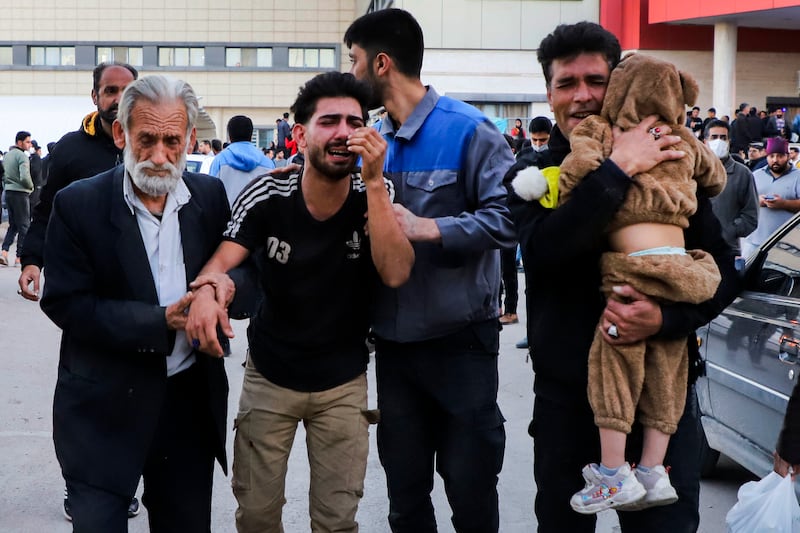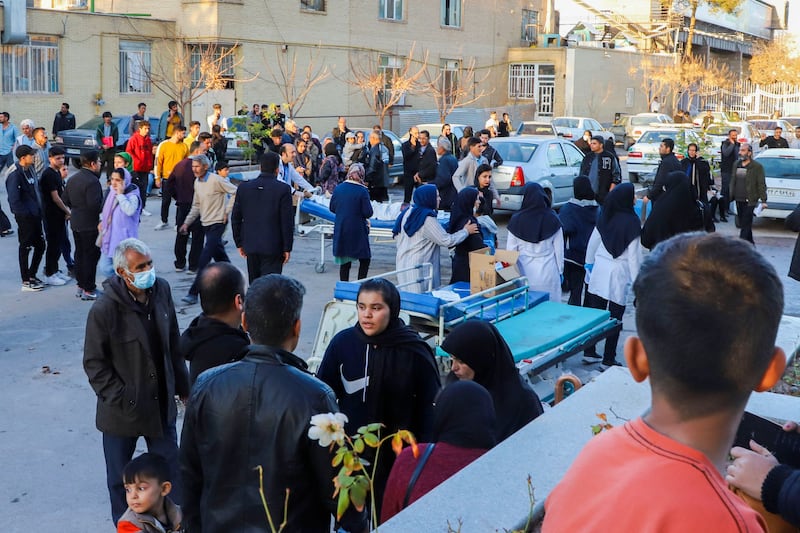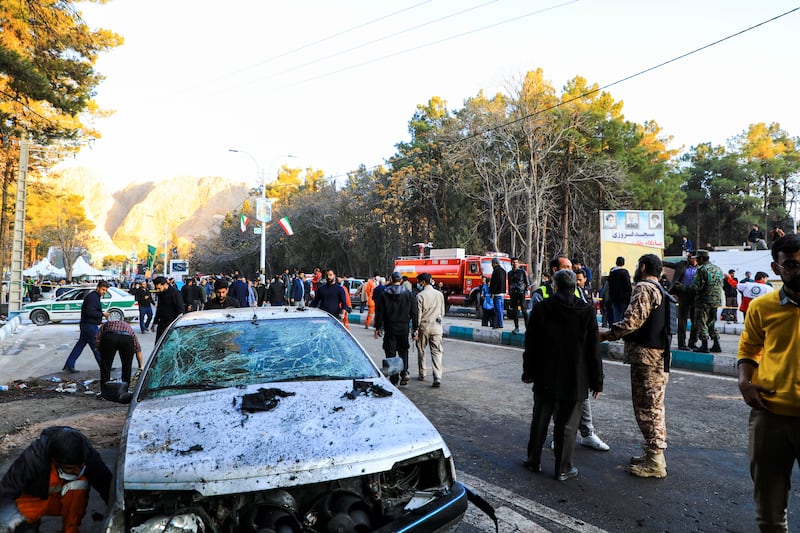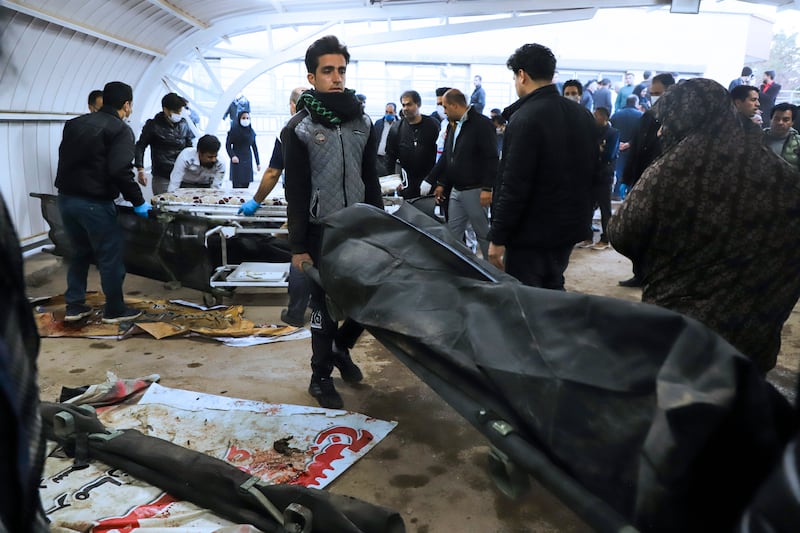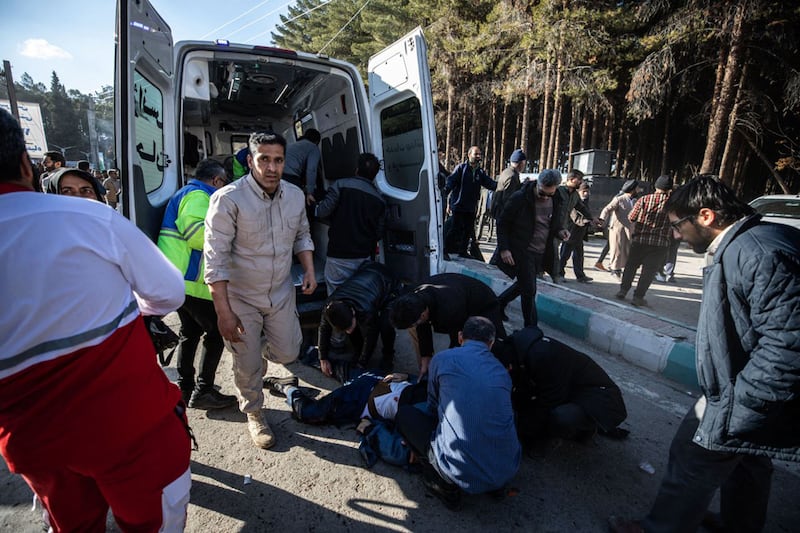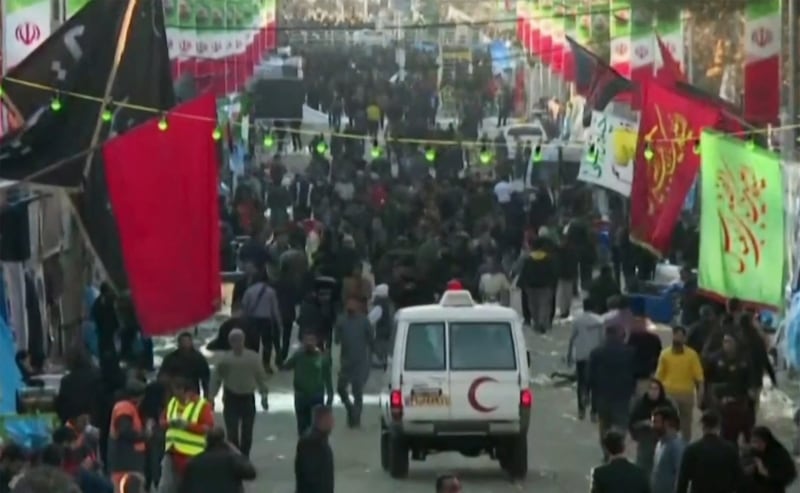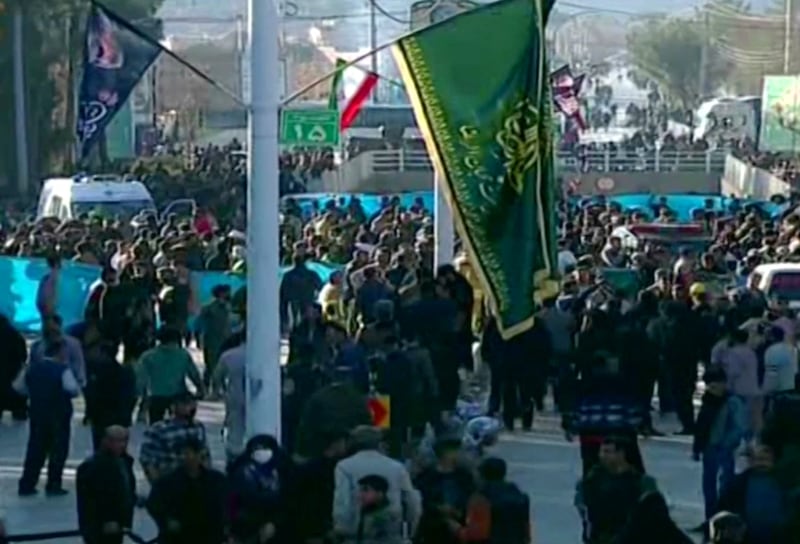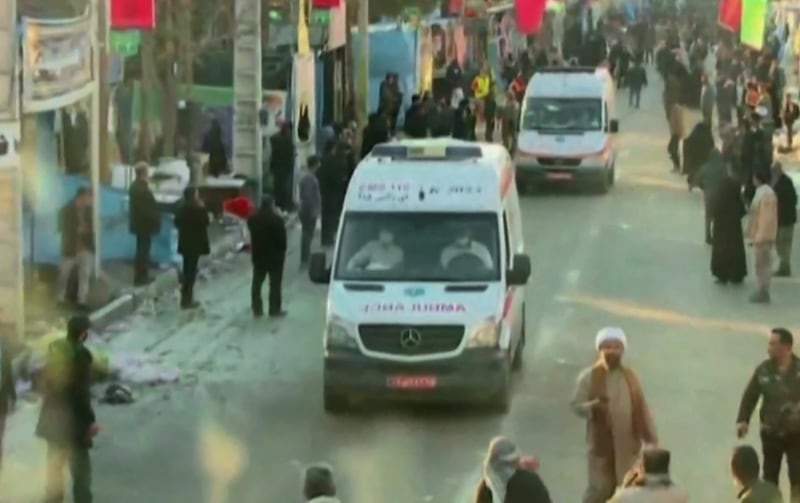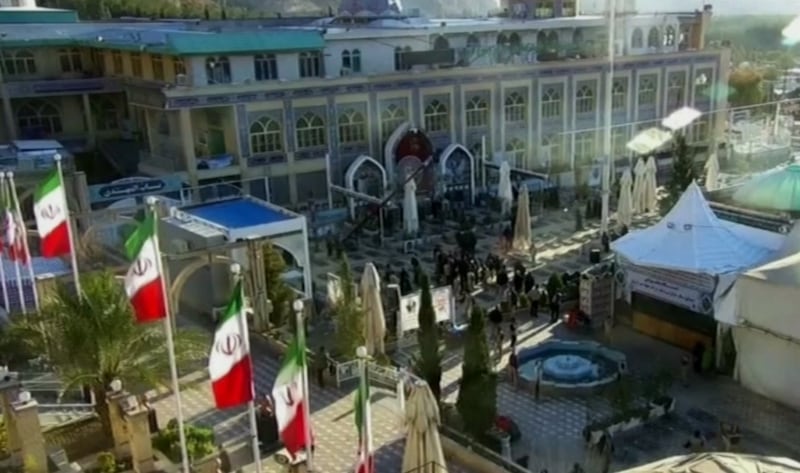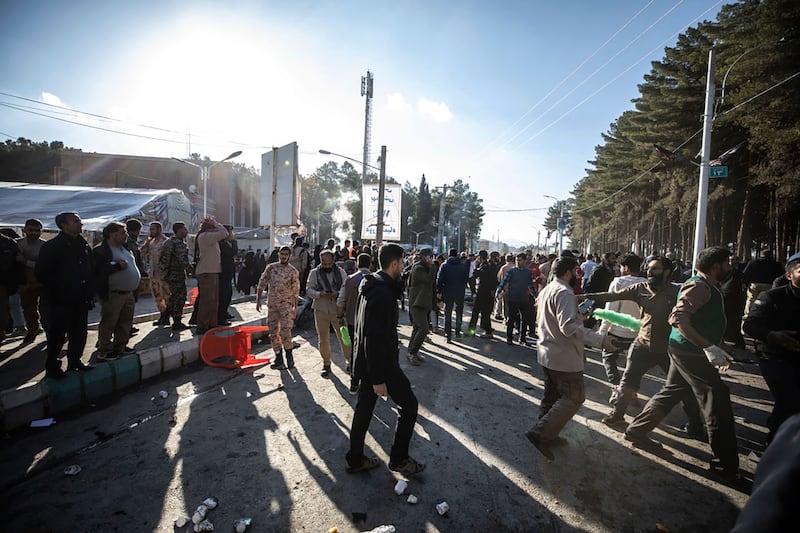About 95 people were killed in two explosions close to where Iranian military leader Maj Gen Qassem Suleimani is buried, state media reported on Wednesday. Supporters had gathered to mark four years since his and others' assassination by the US in Baghdad.
The back-to-back explosions, which took place about 700 metres from the Saheb Al Zaman mosque in Kerman, central Iran, where the Islamic Revolutionary Guard Corps Quds Force commander is buried, injured at least 211, Iran's Tasnim news agency said.
“The second explosion was one kilometre away from the shrine and was outside the path of pilgrims and inspection gates,” state media said.
Iran's Health Minister, Bahram Einollahi, told state TV that the earlier death toll of 103 was lowered after some names had been repeated on a list of victims.
The death toll could rise as many of the wounded were in critical condition.

Footage showed medical teams tending to injured people near the mosque, where thousands had come to mourn.
The IRGC-affiliated Tasnim news agency reported that two bombs were placed near the entrance to the tomb.
Iran's President Ebrahim Raisi said those behind the attack would face action, without specifically accusing anyone.
“Undoubtedly, the perpetrators … of this cowardly act will soon be identified and punished for their heinous act by the capable security and law enforcement forces,” a statement from the President said.
“The enemies of the nation should know that such actions can never disrupt the solid determination of the Iranian nation.”
At least 103 killed in Iran during ceremony marking anniversary of Suleimani's death
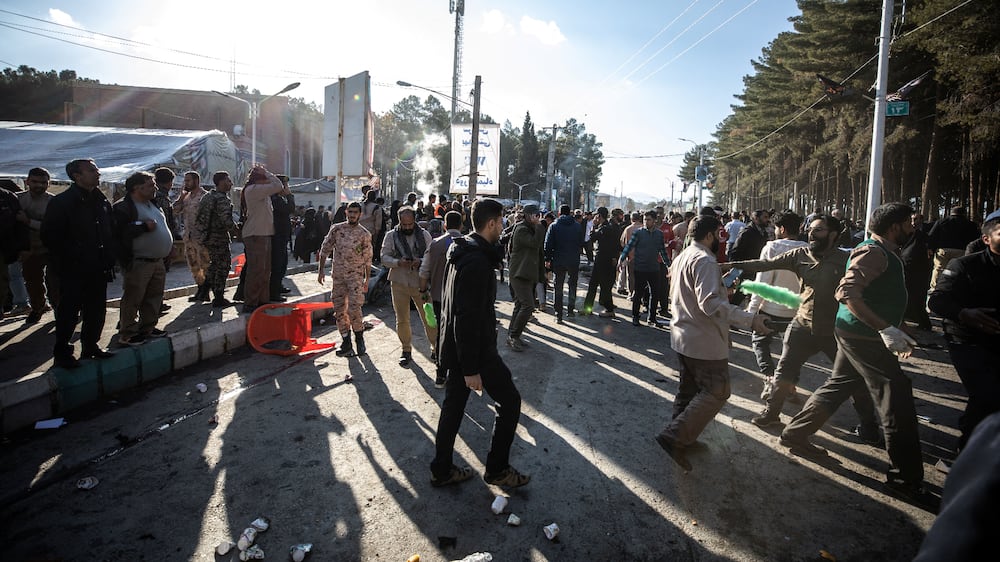
His comments were echoed by Ayatollah Ali Khamenei, the Iranian supreme leader, who said those responsible “will be the definite target of repression and just punishment from now on”.
“Let them know that this disaster will have a harsh response,” he said in a statement carried by Irna state news agency.
“The hard-hearted criminals could not tolerate the love and enthusiasm of the people to visit the shrine of their great commander Qassem Suleimani. Let them know that the soldiers of Suleimani will not tolerate their crime.”
“This terrorist act will be followed by a powerful and crushing response from the security and military apparatuses in the shortest possible time,” said Iran's Interior Minister Ahmad Vahidi.
“The incident is a terrorist attack,” Rahman Jalali, the deputy governor of Kerman province, earlier told state TV.
The senior adviser to Iran's President blamed Israel and the US for the twin blasts.
“Washington says USA and Israel had no role in terrorist attack in Kerman, Iran. Really? A fox smells its own lair first,” Mohammad Jamshidi wrote on X.
“Make no mistake. The responsibility for this crime lies with the US and Zionist regimes and terrorism is just a tool.”
No group has yet claimed responsibility for the explosions.
US State Department spokesman Matthew Miller said it was too early to say what could have caused the explosions, but stressed that the US was not involved in “any way” and that there was “no reason to believe” Israel had any role.
The UAE said it "strongly condemned the terrorist attack" in Kerman. A statement issued by the Ministry of Foreign Affairs also extended condolences to the Iranian government and people.
Saudi Arabia's Ministry of Foreign Affairs said it rejected and condemned “the terrorist bombings that targeted civilians” in Iran.
The EU's top diplomat Josep Borrell offered his condolences to Iran.
Mr Borrell spoke to Iran's Foreign Minister Hossein Amirabdollahian “to convey condolences following the horrific bombings today in Kerman that killed dozens of civilians”, the EU's foreign policy chief said on social media.
“I condemned this terrorist attack in the strongest terms and expressed solidarity with the Iranian people,” he said.
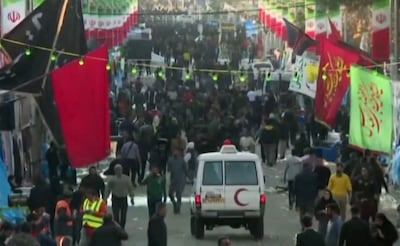
Qassem Suleimani
Maj Gen Suleimani was killed in a US drone strike in Baghdad on January 3, 2020, sending regional tensions soaring and prompting a flurry of rocket attacks on Iraqi military bases where US troops are stationed.
American drones fired three missiles at the convoy as it left Baghdad Airport.
Maj Gen Suleimani was killed, as were the Iraqi militia leader Abu Mahdi Al Muhandis and several aides.
The assassination occurred during a long-running, low-level conflict between pro-Tehran militias and the US. It sparked fears of a direct military confrontation between the two.
The US said at the time that Maj Gen Suleimani was planning imminent action against US personnel in Iraq.
Five days after the killing, Iran fired missiles at an airbase in Iraq housing US troops and another near Erbil in the north, injuring several US troops.
The US military in Iraq has since regularly come under attack from rockets, drones and roadside bombs.
Iranian proxies in Iraq, who have escalated attacks since the start of the Israel-Gaza war on October 7, have called for the expulsion of US troops from Iraq.
Maj Gen Suleimani was the architect of Iran’s regional military activities and proxy groups.
He is revered as a national icon among supporters of Iran’s theocracy.
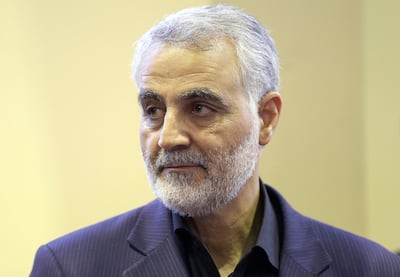
Maj Gen Suleimani helped establish several Iraqi Shiite militias and played a crucial role in raising support for Syrian President Bashar Al Assad's government after the 2011 uprisings against him turned into a civil war that escalated into a regional conflict.
He also maintained co-operation with Hamas as well as the Lebanese Shiite militia Hezbollah and Yemen’s Houthi rebels.
Before the anniversary, Iranians erected huge billboards in the streets commemorating the commander.
In Tehran, one billboard showed Maj Gen Suleimani kissing his mother's hand, while another portrayed him in uniform on a military front line. Hundreds of mourners marched to the cemetery in Kerman.
On Tuesday, Iran’s permanent mission to the UN, said Iran reserves its “legitimate right under international law to pursue legal proceedings to hold accountable and bring to justice perpetrators” of Maj Gen Suleimani’s killing.
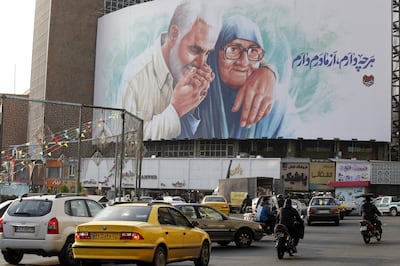
Iraqis mourn 'leaders of victory'
In neighbouring Iraq, where Maj Gen Suleimani was killed alongside the militia leader Abu Mahdi Al Muhandis, some Iraqis have been mourning the death of the two men since Tuesday.
Iraqi Prime Minister Mohammed Shia Al Sudani on Wednesday praised the two as the “leaders of the victory” over ISIS for their role in coordinating operations between Shiite militias against the Sunni extremist group.
After meeting with their families to mark the anniversary, Mr Al Sudani said in a statement: “We recalled, with great respect, the generous sacrifice of the leaders of the victory and their comrades.
“They gave their lives and blood for the security and stability of Iraq,” said the prime minister, who came to power with the support of Iran-backed militias.
Mr Al Sudani did not mention the role played by the US-led coalition against ISIS in the war to destroy the group or as being behind the assassination.
Iraq seeks to 'end presence' of US-led forces in country
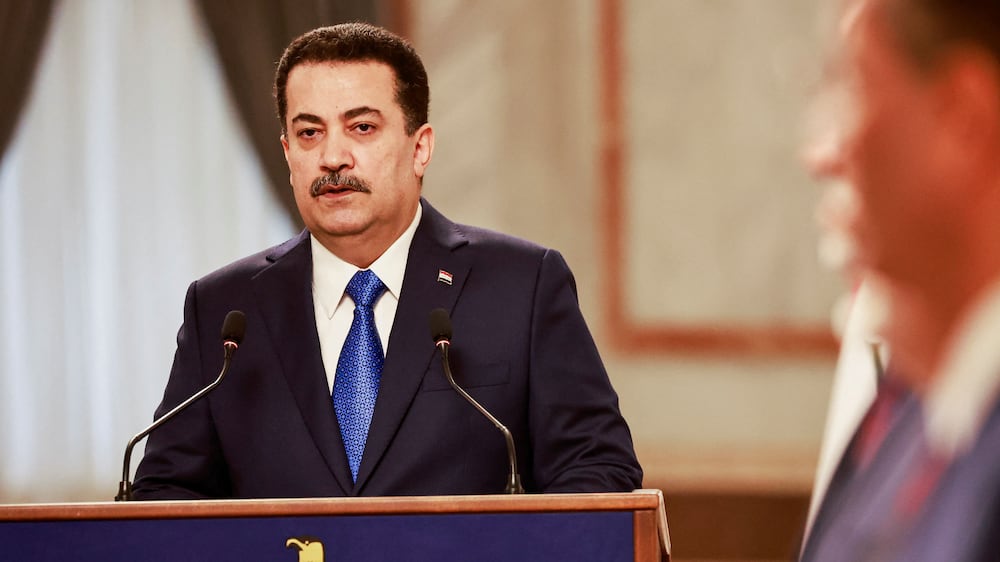
Deputy Parliament Speaker Muhsin Al Mandalawi and senior military officials, including the Chief of the General Staff of the Iraqi Armed Forces Lt Gen Abdul Amir Yarllah joined militia leaders in trampling upon the US flag when visiting Najaf cemetery in southern Iraq to pay their respects to Mr Al Muhandis.
Iran-backed militia groups commemorated the assassination late on Tuesday through the night until dawn on Wednesday.
Hundreds of militiamen, many of them in uniform, gathered at the spot where the missiles hit the convoy on the airport road. Life-size statues of Maj Gen Suleimani and Mr Al Muhandis were unveiled.
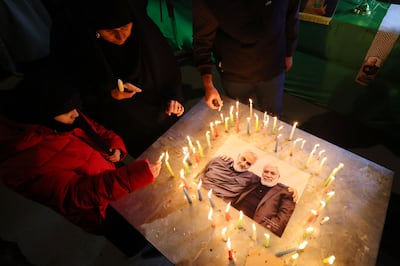
The mourners lit candles and placed flowers next to pictures of the two men, while some waved the Iraqi national flag and the flag of the umbrella organisation for Iran-backed militias in Iraq, known as the Popular Mobilisation Forces (PMF).
Some chanted anti-US slogans and vowed for revenge.
Addressing the crowd, PMF leader Faleh Al Fayadh said both men were “murdered by the treacherous American criminal”.
“We will not forget this crime and we will not stop mentioning it,” Mr Al Fayadh said.
“God willing, Iraq will be liberated from this rebellious group … these troops must leave,” he added, referring to US troops.
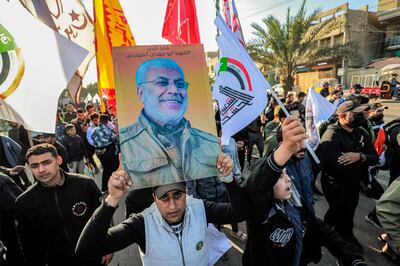
The Iraqi government condemned the Kerman explosions as “terrorist attacks”, expressing “solidarity with Iran, both government and the people, while facing this tragic incident”.
In a statement, Yemen's Houthis extended their “deepest condolences and sympathy” to Iran, saying the “heinous crime is an extension to all the crimes that attempted to undermine the Islamic Republic”.
Holly Johnston and Willy Lowry contributed to this report
